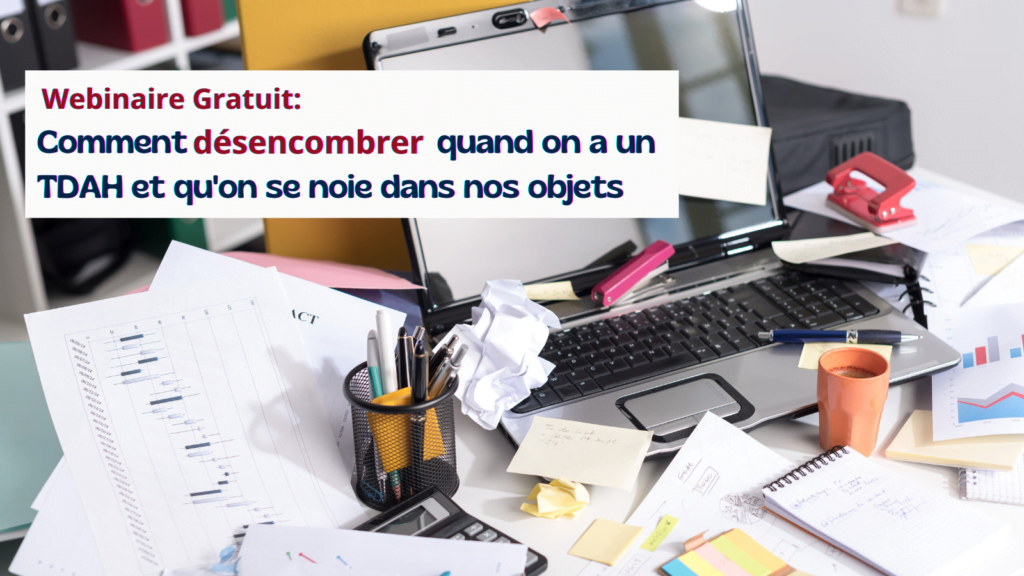CADDAC has hired a resource navigator, but what does that mean for you? Our resource navigator will work with families and individuals affected by ADHD to identify ADHD and mental health resources in your community.
Want to get to know Annie or have questions about how she can help you? Join us on Tuesday July 27 @12:30 PM for a Facebook live session where we will get to know Annie and answer questions about her role.
RSVP on Facebook
or just join us live on the day of the event! Click here to join live. (Link will be live at the time of the event).
Want to be notified via email when we’re getting started?

Quand: le 26 mai, 2021
Heure: 19h00 HNE
Coût: gratuit
Lieu: Virtuel (platforme Zoom)
REGISTERRésumé
Le trouble du déficit de l’attention/hyperactivité (TDAH) est un trouble neuro-développemental qui s’accompagne souvent de certains déficits fonctionnels. Parmi ses difficultés pouvant affecter la vie quotidienne des enfants ayant un TDAH se trouve celles concernant la gestion d’émotions. Cette présentation soulignera les stratégies pour aider aux parents à reconnaitre et étiqueter les émotions de leur enfant, valider leurs émotions, et gérer leurs émotions de façon positive.

Dr. Julie Desjardins, C.Psych. Biographie
Dre Desjardins offre des services de psychologie (p. ex., évaluation et traitement) aux enfants, aux adolescents et aux familles en français et en anglais. Ses principaux domaines d’exercice incluent l’anxiété, la dépression, l’estime de soi, le trouble d’hyperactivité avec déficit de l’attention (THADA), l’évaluation socioémotionnelle, l’évaluation psychoéducative et la thérapie familiale. Dre Desjardins adopte une approche thérapeutique intégrative, mais également systémique et fortement axée sur l’attachement.
En plus de son exercice privé, Dre Desjardins est professeure à temps partiel à l’Université d’Ottawa et superviseure au Centre de recherche et des services psychologiques (CRSP). Elle travaille aussi par contrat pour la Commission scolaire Western Québec.
Dre Desjardins a effectué sa résidence prédoctorale au Centre de recherche et des services psychologiques et elle est agréée auprès de l’Ordre des psychologues de l’Ontario.
This webinar will discuss how ADHD presents in females along with common comorbidities. It will review the literature on hormones and ADHD throughout the lifespan and consider treatment strategies in ADHD during pregnancy and postpartum, as well as discuss the hormonal impact of menopause on cognition
Dr. Sara Binder Biography

Dr. Sara Binder is a consulting psychiatrist at the Foothills Medical Centre in Calgary. She treats adult outpatients who struggle with mood, anxiety, ADHD and substance use disorders. As part of her practice she teaches and supervises psychiatry residents and multidisciplinary students training in mental health. She treats many health care professionals within her practice.
Dr. Binder created an Adult ADHD stream within her clinic which has become one of the only publicly funded adult ADHD clinics based in a hospital setting in Canada.
Dr. Binder works with a team of skilled therapists within a collaborative model of mental health care. She developed and runs an ADHD medication group and an 8 week CBT based ADHD Skills group.
Dr Binder is the Vice Chair of CADDRA and the co-chair of the Education Committee. She is passionate about ADHD – both the clinical aspects but also in educating other healthcare professionals in managing ADHD in adults.
by Dr. Kathleen Nadeau
Although ADHD is the most highly researched childhood disorder in the world, we know less about adults, and almost nothing about older adults with ADHD. Not so long ago we believed that people grew out of ADHD, and even today, most ADHD professionals believe that ADHD is much less an issue for older adults. Statistics show that the percentage of older adults with ADHD is only half of that for younger adults. In this seminar, Kathleen Nadeau will discuss Russell Barkley’s ground breaking research that finds a much shorter lifespan (by 12.7 years!) for adults with combined type ADHD. If this is true, then the lower number of older adults with ADHD is simply a reflection of this shorter lifespan. Many of those with ADHD don’t make it into their 70’s and beyond.
Accurate diagnosis and treatment for older adults is critical, yet few psychiatrists, neurologists and psychologists are trained in the diagnosis and treatment of ADHD in older adults. As a result, there is a strong risk that never diagnosed ADHD in older adults will be mistaken for early signs of dementia.
In this webinar, you will learn:
.
Dr. Nadeau's Biography

Kathleen Nadeau has been studying older adults for the past several years, interviewing older adults with ADHD across the country, as she works on her upcoming, ground-breaking book Still Distracted After All These Years. She will discuss the life stories, the challenges and the successes of the adults she has come to know.
Kathleen Nadeau, PhD is the founder and clinical director of The Chesapeake Center – ADHD Learning and Behavioral Health in Bethesda, MD, one of the largest private ADHD specialty clinics in the United States. She is the recipient of the CHADD Hall of Fame Award for her work in collaboration with Patricia Quinn, MD on girls and women with ADHD. She is the author of over a dozen books on ADHD and is a frequent lecturer both nationally and internationally.

SESSION DESCRIPTION
Are you in a relationship with someone with ADHD and having difficulty understanding how and why the same issues keep arising? ADHD can be a significant factor in a variety of relationship problems. However when you understand how ADHD plays a role in the relationship, misinterpreted motives and hurt feelings can be mitigated. Our presenter, who has been married for 46 years to her husband with ADHD, will share her insights on what to do, what not to do and how to use your new understanding of ADHD to improve your relationship.
SPEAKER BIO
Heidi Bernhardt
Heidi Bernhardt, RN, is a psychiatric nurse by training, mother of three young men with ADHD, and the founder and former Executive Director of the Centre for ADHD Awareness Canada (CADDAC), a national not-for-profit organization dedicated to awareness, education, and advocacy for ADHD. Heidi also served as the Executive Director of the Canadian ADHD Resource Alliance (CADDRA), a national not-for-profit organization of the leading clinicians and researchers in ADHD in Canada for 6 years. Over the past 25 years, Heidi Bernhardt has helped raise awareness and understanding of ADHD among parents, educators, health care professionals, industry leaders, and government officials through presentations, conferences, media interviews, and advocacy work.
CADDAC would like to thank the Zorzi Family, Janssen Inc., and Takeda Canada for generously supporting this event.
The information provided during this educational workshop is for informational purposes only and is not intended to be professional medical advice, diagnosis, treatment or care. Never disregard professional medical advice or delay in seeking it because of something you have heard during this workshop. By accessing or attending this workshop, you are indicating your acceptance to be bound by the terms and conditions of the user agreement as stated in full.

Date : Jeudi 11 février, 2021 19h30 HNE
Présentateur: Nathalie Pedicelli
*Les participants recevront un enregistrement des sessions après le webinaire.
SESSION DESCRIPTION
Vous êtes en relation avec une personne souffrant du TDAH et vous avez des difficultés à comprendre comment et pourquoi les mêmes problèmes continuent à se présenter ? Le TDAH peut être un facteur important dans plusieurs des problèmes relationnels, mais lorsque vous comprenez comment le TDAH joue un rôle dans cette relation, les motifs mal interprétés et les sentiments blessés peuvent être atténués. Notre présentatrice, atteinte du TDAH et mariée depuis 26 ans à son conjoint neuro-typique, vous fera part de ses réflexions sur ce qu'il faut faire, ce qu'il ne faut pas faire et comment utiliser votre nouvelle compréhension du TDAH pour améliorer votre relation.
Courte biographie - Nathalie Pedicelli de chez Métamorphoses Organisation
Nathalie Pedicelli est une Organisatrice professionnelle dynamique et une Coach TDAH qui met à profit ses 25 années d'expérience dans l'organisation de personnes, de lieux et d'événements dans des entreprises de toutes tailles, tout en aidant les gens à apprivoiser leur chaos à la maison et au bureau. Elle est également une conférencière dont les exposés portent sur la manière dont l'organisation et le coaching aident les personnes atteintes du TDAH à vivre une vie moins stressante et plus productive.
Diagnostiquée à l'âge de 44 ans, elle encourage ses clients à adapter leur environnement à la façon de penser et de faire des personnes atteintes du TDAH. Elle utilise une approche holistique et met en place des systèmes et des structures qui permettent à ses clients de vivre avec une plus grande liberté et moins d'anxiété. En 2020, Nathalie est devenue la première Coach organisatrice TDAH au Canada.
Lorsque Nathalie n'est pas occupée à organiser quelque chose, elle peut être repérée à l'extérieur dans son jardin ou en camping et à l'intérieur, elle peut apprendre les drapeaux du monde tout ou visionner un film de science-fiction ou de fantaisie.

Date : Jeudi 14 janvier, 2021 19h30 HNE
Présentateur: Nathalie Pedicelli
*Les participants recevront un enregistrement des sessions après le webinaire.
DESCRIPTION DE LA SESSION
Avez-vous pris la résolution, au Nouvel An, d'organiser enfin votre espace domestique en 2021? Peut-être avez-vous essayé les années précédentes de vous organiser, mais chaque tentative a échoué et vous avez fini par vous sentir dépassé. Peut-être que c'est parce que vous n'avez pas utilisé un style de désencombrement adapté au TDAH.
En moyenne, les gens passent 153 jours (soit 6 mois) de leur vie à chercher des objets mal rangés, dont 75% sont à la maison. En conséquence, 43 % des personnes se sentent stressées par leur désorganisation. Ce temps passé à chercher des objets est amplifié lorsque le TDAH est présent.
L'état physique de votre maison est souvent une représentation de ce que vous ressentez dans votre tête. Cet encombrement mental peut conduire à l'anxiété ou à la dépression et peut définir votre sentiment général de bien-être.
Des études ont montré que l'encombrement affecte négativement votre perception de votre maison et votre capacité à avoir du plaisir dans cet espace. Cet effet se répercute au-delà de la maison, ce qui entraîne une baisse de votre satisfaction à l'égard de la vie en général.
Un problème important pour les personnes souffrant du TDAH lorsqu'il s'agit de lâcher leurs objets est lié à la prise de décision et à l'utilisation potentielle. Ils ne cessent de différer la décision de ce qu'ils doivent faire de certains biens, si bien que les piles ne cessent de s'accumuler. Certains s'accrochent à des objets parce qu'ils espèrent les convertir en quelque chose d'autre ou les utiliser plus tard pour un passe-temps qu'ils espèrent commencer. Le nettoyage devient plus difficile.
Les objets sont plus facilement égarés en raison de la distraction et d'une mauvaise mémoire, ce qui les rend souvent en retard au travail simplement parce qu'ils ne trouvent pas leurs clés ou leur téléphone cellulaire. Les disputes avec le conjoint deviennent plus fréquentes à mesure que le désordre s'accumule. L'accablement s'installe et l'inaction devient la norme.
Cette session est conçue pour vous aider à :
1 - Reconnaître les raisons principales qui contribuent à l'accumulation du désordre en présence d'un TDAH et comment cela devient un problème dans la vie quotidienne.
2 - Utiliser une méthode adaptée au TDAH pour améliorer votre capacité à lâcher prise.
3 - Appliquer des stratégies qui vous aident à maintenir une maison ou un bureau organisé.
Courte biographie - Nathalie Pedicelli de chez Métamorphoses Organisation
Nathalie Pedicelli est une Organisatrice professionnelle dynamique et une Coach TDAH qui met à profit ses 25 années d'expérience dans l'organisation de personnes, de lieux et d'événements dans des entreprises de toutes tailles, tout en aidant les gens à apprivoiser leur chaos à la maison et au bureau. Elle est également une conférencière dont les exposés portent sur la manière dont l'organisation et le coaching aident les personnes atteintes du TDAH à vivre une vie moins stressante et plus productive.
Diagnostiquée à l'âge de 44 ans, elle encourage ses clients à adapter leur environnement à la façon de penser et de faire des personnes atteintes du TDAH. Elle utilise une approche holistique et met en place des systèmes et des structures qui permettent à ses clients de vivre avec une plus grande liberté et moins d'anxiété. En 2020, Nathalie est devenue la première Coach organisatrice TDAH au Canada.
Lorsque Nathalie n'est pas occupée à organiser quelque chose, elle peut être repérée à l'extérieur dans son jardin ou en camping et à l'intérieur, elle peut apprendre les drapeaux du monde tout ou visionner un film de science-fiction ou de fantaisie.
SESSION DESCRIPTION
Have you made a New Year’s resolution to finally organize your home space in 2021? Perhaps, you tried in previous years to get organized, but every attempt failed, and you ended up feeling overwhelmed. Maybe, it was because you were not using an ADHD-friendly style of decluttering.
On average people spend 153 days (that’s 6 months) of their lives looking for misplaced items, of which 75% are misplaced at home. As a result, 43% of people feel stressed due their disorganization. These numbers of time spent looking for items is amplified when ADHD is at play.
The physical state of your home is often a representation of how you feel in your head. This mental clutter can lead to anxiety or depression and can define your overall sense of well being.
Studies have shown that clutter negatively affects your perception of your home and your ability to have pleasure while in that space. This effect spills out beyond the home leading to lower overall satisfaction with life in general.
A big problem for people with ADHD when it comes to letting go of their items has to do with decision making and potential use. They keep differing the decision of what to do with specific possessions, so the piles keep growing. Some hang on to things because they hope to convert it into something else or use it later for a hobby they hope to start. Cleaning becomes more difficult.
Items become more easily misplaced due to distraction and poor memory, often making them late for work simply because they cannot find their keys or their cellphone. Arguments with the spouse become more frequent as the mess builds up. Overwhelm sets in and inaction becomes the norm.
This session is designed to help you:
1 – Recognize the core reasons that contribute to clutter build-up when ADHD is present and how this becomes an issue in daily life.
2 – Utilize an ADHD-friendly method to improve your ability to let go of items.
3 – Apply strategies that help with your overall ability to maintain an organized home or office.
SPEAKER BIO
Nathalie Pedicelli, Organize.Thrive.Monetize.
Nathalie Pedicelli is a dynamic Professional Organizer and ADHD Coach who uses her 25 years of experience organizing people, places and events in large, small and microbusinesses while helping people tame their chaos at home and at the office. She is also a speaker whose talks focus on how organization and coaching help people with ADHD live less stressful and more productive lives.
Diagnosed with ADHD at age 44, she encourages her clients to adapt their environment to the ADHD way of thinking and doing things. She uses a holistic approach and puts systems and structures in place that allow her clients to live with greater freedom and less anxiety. In 2020, Nathalie become the first trained ADHD Organizer Coach in Canada.
When Nathalie is not busy organizing something, she can be spotted outdoors in her garden or camping and indoors, she might be learning the flags of the world while indulging in a sci-fi or fantasy movie.
CADDAC would like to thank the Zorzi Family, Janssen Inc., and Takeda Canada for generously supporting this event.
The information provided during this educational workshop is for informational purposes only and is not intended to be professional medical advice, diagnosis, treatment or care. Never disregard professional medical advice or delay in seeking it because of something you have heard during this workshop. By accessing or attending this workshop, you are indicating your acceptance to be bound by the terms and conditions of the user agreement as stated in full.
Title: TDAH et sommeil
Date: 10 novembre 2020, 19h HNE
Inscrivez-vous pour le webinaire ici.
Résumé
Le TDAH est un trouble présent pendant 24 heures. Les difficultés de sommeil associées au TDAH comprennent un rythme circadien différé (s'endormir trop tard) et la présence de variabilité dans les habitudes de sommeil pouvant varier d’une nuit à l’autre. Les difficultés de sommeil aggravent ensuite les problèmes d'attention et de contrôle des impulsions. Le TDAH est un trouble de l'autorégulation qui rend notamment l'entraînement à un rythme de sommeil régulier plus difficile. Ce webinaire examinera comment les familles et les personnes atteintes de TDAH peuvent améliorer ce cercle vicieux et comment, en obtenant une bonne nuit de sommeil, leur bien-être pendant la journée peut être amélioré.
Bio
Sophie St-Pierre est une étudiante de première année au programme de doctorat en psychologie clinique D. Psy à l’Université du Québec en Outaouais. Elle a travaillé en tant qu’assistante de recherche auprès des enfants ayant un trouble déficitaire de l’attention avec ou sans hyperactivité (TDAH) et leurs parents. Sophie a des expériences de travail diverses auprès des enfants et des adolescents en tant qu’enseignante suppléante, éducatrice spécialisée, tutrice, animatrice de camp d’été et psychométricienne. Plus précisément, ces expériences de travail antérieures lui ont permis de travailler auprès des enfants et des adolescents présentant un trouble du spectre de l’autisme, une déficience intellectuelle, un TDAH et des troubles de l’apprentissage. Sophie a toujours adoré travailler et faire de la recherche auprès des enfants, des adolescents et leurs familles.
Title: ADHD and Sleep
Speaker: Dr. Margaret Weiss
Abstract - ADHD is a 24-hour disorder. Nighttime difficulties associated with ADHD include delayed circadian rhythm (going to sleep too late) and night to night variability in sleep patterns. Difficulties with sleep further exacerbate problems with attention and impulse control. ADHD is a disorder of self-regulation that also makes it more difficult to entrain a regular sleep rhythm. This webinar will review how families and individuals with ADHD can improve this vicious cycle and in obtaining a good night’s sleep improve their well-being during the day as well.
Biography
Dr. Weiss is best known for her research demonstrating that melatonin is a safe and effective treatment for initial insomnia in ADHD; her work on medication development; the Weiss
Functional Impairment Scale; and her recent studies of quality of life and functional impairment as important outcomes. As a full time clinician, she has made the agenda of her research the translation of clinical practice into evidence based care.
Dr. Weiss has published over 90 peer-reviewed articles relating to these topics. She is the author of two book chapters on ADHD, and coauthored the book ADHD in Adulthood: A Guide to Current Theory, Diagnosis, and Treatment. Dr. Weiss is known for her research demonstrating that melatonin is a safe and effective treatment for initial insomnia in ADHD.. She was the Director of the ADHD Program at Children’s Hospital for 15 years. She has helped launch and participated in writing the Canadian guidelines for ADHD for the last four editions.
CADDAC would like to thank the Zorzi Family, Janssen Inc., and Takeda Canada for generously supporting this event.
The information provided during this educational workshop is for informational purposes only and is not intended to be professional medical advice, diagnosis, treatment or care. Never disregard professional medical advice or delay in seeking it because of something you have heard during this workshop. By accessing or attending this workshop, you are indicating your acceptance to be bound by the terms and conditions of the user agreement as stated in full.